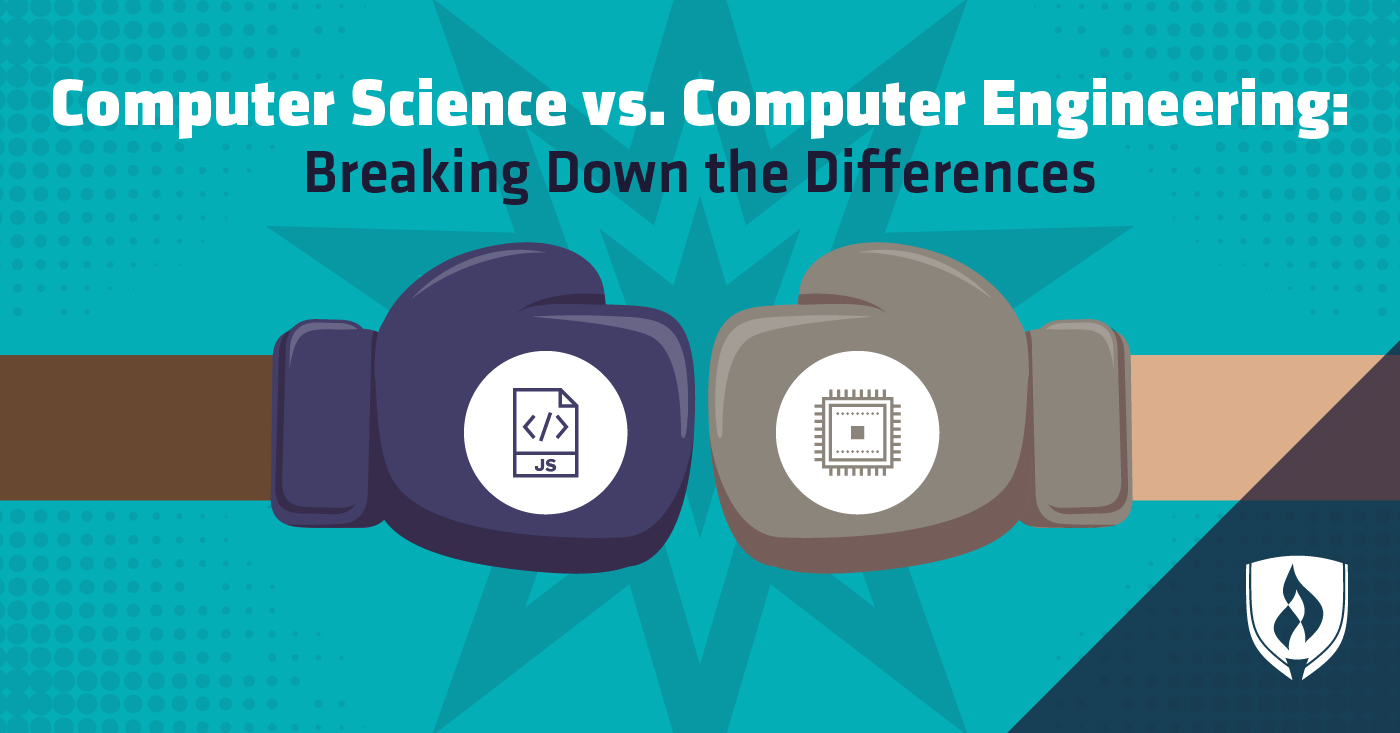Computer Science vs. Computer Engineering: Breaking Down the Differences
By Brianna Flavin on 03/18/2019

You know you like computers. This affinity isn’t just based on the things you can do with them—though going online, playing games, making music and so on is pretty great. You like knowing what’s going on behind the scenes to make these little whirring boxes into the transformative powerhouses that they are. You like this field so much you’re even considering turning this fascination into a career.
But majoring in something as broad as just “computers” isn’t a typical college option as most schools narrow it down. The subjects “computer science” and “computer engineering” have both caught your eye. It’s true that both of these two focus areas can unlock appealing job opportunities that get lots of student attention. But how are you supposed to choose?
What’s the difference between computer science and computer engineering? Which one would you prefer as a college major or career choice? Despite their similarities, each of these disciplines offers some specific roles. We dug into the research and relied on expert advice in these fields to make things a bit clearer.
If you’ve been trying to figure out computer science versus computer engineering, you’ve come to the right place.
Computer science vs. computer engineering: General breakdown
As in many technology-based fields, there tends to be a little confusion and blurring of lines between disciplines. In some cases, these varied subject names are a matter of semantics where the same general information is just labeled differently, while others have much more pronounced differences. For the subjects of computer science and computer engineering, there’s definitely a clear split despite some overlapping focuses.
Duke University does an excellent job of breaking it down: Computer science programs are often focused on mathematics and the theoretical foundation of computation, while computer engineering focuses on the practical aspects of development and computer usage.1
You could think about the difference in terms of goals. “Computer science is looking to progress the general understanding of certain phenomena or technologies,” says Jesse Nieminen, co-founder and chairman of Viima. “Computer engineering is the application of (scientific) knowledge to design and build new things.”
Another view that can help you better understand these disciplines is to look at where they emerged from. Early computer science programs were (and sometimes still are) branches from universities’ mathematics departments, while computer engineering branched off from engineering or electrical engineering departments.
In terms of practice, Nieminen says computer scientists create or apply new theories and mathematical models that can then be used in software systems. Someone who focuses on computer engineering will focus more on the technical specifications needed for hardware to support those systems.
Computer science vs. computer engineering: Job titles
So how would choosing one path or the other affect your potential career? The good news is that both routes have outcomes that may appeal to you, and many tech careers sit neatly where the two fields overlap.
That being said, we used real-time job analysis software to find out what positions employers are looking to fill with applicants from computer science and computer engineering majors. Here’s a quick snapshot.
Top job titles seeking computer science majors2
- Software Development Engineer
- Business Analyst
- Java Developer
- Systems Engineer
- Data Analyst
Top job titles seeking computer engineering majors2
- Software Development Engineer
- Systems Engineer
- Software Developer
- Network Engineer
- Firmware Engineer
As you can see, most of these jobs cross over into both majors. The commonalities apply in skill sets as well. The skills that employers of computer science and computer engineering majors want most in their applicants are almost identical. Languages like SQL, Java®, JavaScript® and Python® all were among the top technical skills sought after in job postings seeking computer science grads as well as computer engineering grads.2
Computer science vs. computer engineering: Choosing your focus
“Computer science is more theoretical and prepares you well for a career as an expert in certain topics,” Nieminen says. “If you love going deep on certain technical topics, it’s a good fit for you.”
On the other side of the coin, computer engineering is slightly more practical and prepares you well for a business-oriented career where your job is to build software systems and teams, Nieminen explains. “If you’re the kind of person who enjoys seeing your handiwork used and doesn’t mind constant variety in the problems you solve, it’s a great fit for you.”
Companies often hire a mix of specialists for expert areas they need covered, as well as generalists who understand the larger principles at play and can perform a wide range of tasks, according to Nieminen.
“My company is still quite small and evolving fast—so we prefer to hire generalists, often with an engineering background. However, as the company grows, we will need expertise in areas like artificial intelligence, which is when we’re likely to hire specialist computer scientists.”
A career in shaping the future
Whether you feel more drawn to computer science or computer engineering—you are considering an inspiring industry. “Either one is a brilliant choice that will equip you well for the demands of the future,” Nieminen says. “I’ve seen firsthand how many opportunities there are for us to tackle and how sorely today’s society needs our skills.”
Earning an education in these areas can open up a huge range of potential careers all over the country. If you’d like to learn more about those options, you’ll want to check out our article “What Can You Do With a Computer Science Degree?”
If you aren’t feeling confident about computer science or computer engineering being the right direction for you, our interactive tool “Which Tech Degree Is Right for Me?” can help you find your focus.
1Duke University, Pratt School of Engineering, Computer Science vs. Electrical and Computer Engineering [accessed February 11, 2019] https://pratt.duke.edu/undergrad/admissions/faq/cs-vs-ce
2Burning-Glass.com (analysis of 802,177 job postings inferring a bachelor’s degree in computer science and 802,177 job postings inferring a bachelor’s degree in computer engineering. Jan. 01, 2018 and Dec. 31, 2018)
Java and JavaScript are registered trademarks of Oracle Corporation.
Python is a registered trademark of The Python Software Foundation.




